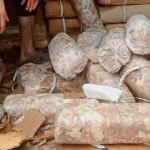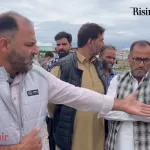Srinagar, Aug 10: In 2024, India witnessed a significant rise in cancer cases, with an estimated 15,33,055 new diagnoses, according to data shared by the Ministry of Health and Family Welfare citing the National Cancer Registry Programme (ICMR-NCRP).
Union Minister of State for Health and Family Welfare, PratapraoJadhav, provided these figures during a recent LokSabha session, highlighting a worrying upward trend in cancer incidence over the past six years.
“Indian Council of Medical Research (ICMR) has informed that as per the National Cancer Registry Programme (ICMR-NCRP) data, the estimated incidence of cancer cases in the country for 2024 is 15,33,055,” the reply said.
In 2019, the number of cases stood at 13,58,415, which increased to 13,92,179 in 2020 and 14,26,447 in 2021. The upward trend continued in 2022 with 14,61,427 cases, followed by 14,96,972 cases in 2023.
This consistent rise reflects not only the increasing incidence of cancer but also the urgent need for enhanced prevention, early detection, and treatment strategies across the country.
The estimated mortality due to cancer in India has been steadily increasing over recent years, underscoring the disease’s growing toll on public health.
“In 2019, 7,51,517 people were estimated to have died from cancer, a number that rose to 7,70,230 in 2020 and further to 7,89,202 in 2021. The upward trend persisted in 2022 with 8,08,558 deaths, reaching 8,28,252 in 2023,” Jadhav said.
The reply said that the projected mortality cases for India were computed by applying Mumbai Mortality/Incidence (MI) ratio to the estimated incidence cancer cases.
“The reasons for increase in number of estimated cancer cases is due to access and availability of improved diagnostic techniques for detection of cancer, increased life expectancy, growing share of geriatric population, higher health consciousness and improved health seeking behaviour,” the Minister said.
It said there has been a significant increase in classical risk factors associated with Non-Communicable Diseases (NCDs), including cancer, such as tobacco, alcohol consumption, lack of physical activities, unhealthy diets, consumption of high salt, sugar, saturated fats, etc.
The reply further said that the government has undertaken the National Programme for Non-Communicable Diseases (NP-NCD). The program aims on prevention and control of common NCDs risk factors through an integrated approach and reduction of premature morbidity and mortality from cancer and other NCDs.
‘The focus of this program is on health promotion, early diagnosis, management and referral of cases, besides strengthening infrastructure and capacity building. Capacity building is provided at various levels of health care for prevention, early diagnosis, cost-effective treatment, rehabilitation, awareness and behaviour change communication,” the minister said in the reply.
The Ministry has also initiated a national screening programme to screen three common cancers like oral, breast and cervix.
The ICMR has warned of a potential cancer epidemic, particularly affecting lower-income countries. Public health experts say India is still not up to the mark despite being a Lower Middle-Income Country (LMIC) according to World Health Organization standards.
Dr. Sameer Kaul, a top Surgical Oncologist at Apollo Hospitals Indraprastha in Delhi told Rising Kashmir the condition in the country is same as that of Pakistan, Bangladesh, Brazil and other Southeast Asian countries.
“Fund availability is important for NCDs, including cancer and heart diseases. Looking at the epidemic of cancer we need to speed up measures to counter this. We are not on the mark,” he said.
Although the Government of India has established cancer centres in medical colleges and district hospitals in the country with experts saying much more still needs to be done to improve cancer care.
Notably, as per the Population-Based Cancer Registry, J&K recorded 64,463 cancer cases over the past seven years, including 50,551 from Kashmir and 13,912 from Jammu.
“We need to focus on medical insurance, especially in Jammu and Kashmir, as treatment is inadequate and people do not have money to afford it,” Dr Sameer said.
He said new cancer treatments are expensive and even the wealthiest governments in the US have struggled to provide them due to the high financial requirements.
In July 2025, the Health Ministry approved six Day Care Cancer Centres (DCCCs) for Jammu and Kashmir, located in Jammu, Shopian, Reasi, Samba, Ramban, and Kishtwar. These centres are part of a nationwide plan to establish over 200 DCCCs in rural areas to enhance cancer care services.
In July this year, the Health Ministry approved six Day Care Cancer Centres (DCCCs) for Jammu and Kashmir to be set up in Jammu, Shopian, Reasi, Samba, Ramban, and Kishtwar.
These are part of over 200 Day Care Cancer Centres approved for establishment across the country for the financial year 2025–26 to upgrade the cancer care facilities in rural areas.








